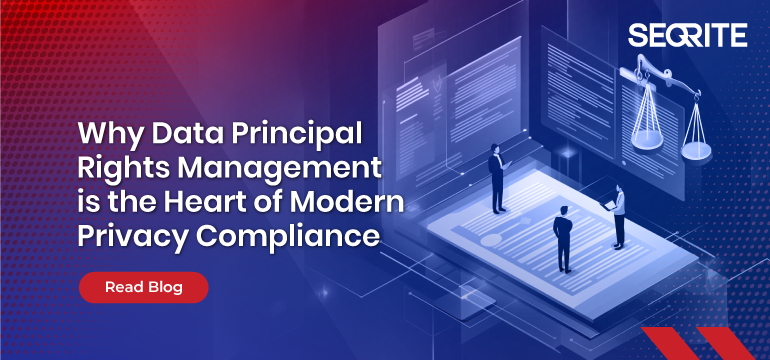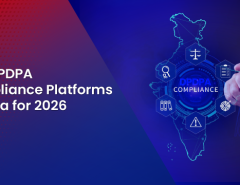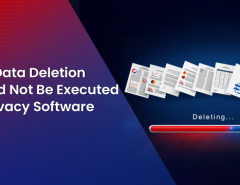As data privacy laws evolve globally—from the GDPR to India’s Digital Personal Data Protection Act (DPDPA)—one common theme emerges: empowering individuals with control over their data. This shift places data principal rights at the center of privacy compliance.
Respecting these rights isn’t just a legal obligation for organizations; it’s a business imperative. Efficiently operationalizing and fulfilling data principal rights is now a cornerstone of modern privacy programs.
Understanding Data Principal Rights
Data principal rights refer to the entitlements granted to individuals regarding their data. Under laws like the DPDPA and GDPR, these typically include:
- Right to Access: Individuals can request a copy of the personal data held about them.
- Right to Correction: They can demand corrections to inaccurate or outdated data.
- Right to Erasure (Right to Be Forgotten): They can request deletion of their data under specific circumstances.
- Right to Data Portability: They can request their data in a machine-readable format.
- Right to Withdraw Consent: They can withdraw previously given consent for data processing.
- Right to Grievance Redressal: They can lodge complaints if their rights are not respected.
While these rights sound straightforward, fulfilling them at scale is anything but simple, especially when data is scattered across cloud platforms, internal systems, and third-party applications.
Why Data Principal Rights Management is Critical
- Regulatory Compliance and Avoidance of Penalties
Non-compliance can result in substantial fines, regulatory scrutiny, and reputational harm. For instance, DPDPA empowers the Data Protection Board of India to impose heavy penalties for failure to honor data principal rights on time.
- Customer Trust and Transparency
Respecting user rights builds transparency and demonstrates that your organization values privacy. This can increase customer loyalty and strengthen brand reputation in privacy-conscious markets.
- Operational Readiness and Risk Reduction
Organizations risk delays, errors, and missed deadlines when rights requests are handled manually. An automated and structured rights management process reduces legal risk and improves operational agility.
- Auditability and Accountability
Every action taken to fulfill a rights request must be logged and documented. This is essential for proving compliance during audits or investigations.
The Role of Data Discovery in Rights Fulfilment
To respond to any data principal request, you must first know where the relevant personal data resides. This is where Data Discovery plays a crucial supporting role.
A robust data discovery framework enables organizations to:
- Identify all systems and repositories that store personal data.
- Correlate data to specific individuals or identifiers.
- Retrieve, correct, delete, or port data accurately and quickly.
Without comprehensive data visibility, any data principal rights management program will fail, resulting in delays, partial responses, or non-compliance.
Key Challenges in Rights Management
Despite its importance, many organizations struggle with implementing effective data principal rights management due to:
- Fragmented data environments: Personal data is often stored in silos, making it challenging to aggregate and act upon.
- Manual workflows: Fulfilling rights requests often involves slow, error-prone manual processes.
- Authentication complexities: Verifying the identity of the data principal securely is essential to prevent abuse of rights.
- Lack of audit trails: Without automated tracking, it’s hard to demonstrate compliance.
Building a Scalable Data Principal Rights Management Framework
To overcome these challenges, organizations must invest in technologies and workflows that automate and streamline the lifecycle of rights requests. A mature data principal rights management framework should include:
- Centralized request intake: A portal or dashboard where individuals can easily submit rights requests.
- Automated data mapping: Leveraging data discovery tools to locate relevant personal data quickly.
- Workflow automation: Routing requests to appropriate teams with built-in deadlines and escalation paths.
- Verification and consent tracking: Only verified individuals can initiate requests and track their consent history.
- Comprehensive logging: Maintaining a tamper-proof audit trail of all actions to fulfill requests.
The Future of Privacy Lies in Empowerment
As data privacy regulations mature, the focus shifts from mere protection to empowerment. Data principles are no longer passive subjects but active stakeholders in handling their data. Organizations that embed data principal rights management into their core data governance strategy will stay compliant and gain a competitive edge in building customer trust.
Empower Your Privacy Program with Seqrite
Seqrite’s Data Privacy Suite is purpose-built to help enterprises manage data principal rights confidently. From automated request intake and identity verification to real-time data discovery and audit-ready logs, Seqrite empowers you to comply faster, smarter, and at scale.




